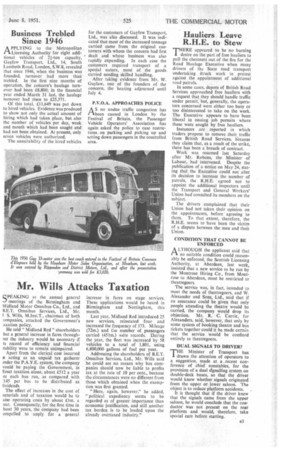Hauliers Leave R.H.E. to Stew
Page 37

If you've noticed an error in this article please click here to report it so we can fix it.
THERE appeared to be no burning I desire on the part of free hauliers to pull the chestnuts out of the fire for the Road Haulage Executive when many drivers of the State road transport undertaking struck work in protest against the appointment of additional road patrols.
In some cases, depots of British Road Services approached free hauliers with a request that they should handle traffic under permit, but, generally, the operators concerned were either too busy or too disinterested to take on the work. The Executive appears to have been liberal in issuing job permits where these were sought by free hauliers.
Instances are reported in which traders propose to remove Their traffic from British Road Services, because they claim that, as a result of the strike, there has been a breach of contract.
Work was resumed last Saturday after Mr. Robens, the Minister of Labour, had intervened. Despite the publication of a notice on May 24, stating that the Executive could not alter its decision to increase the number of patrols, the R.H.E. agreed not to appoint the additional inspectors until the Transport and General Workers' Union had consulted its members on the subject.
The drivers complained that their Union had not taken their opinion on the appointments, before agreeing to them. To that extent, therefore, the R.H.E. seems to have been the victim of a dispute between the men and their Union.
CONDITION THAT CANNOT BE ENFORCED
ALTHOUGH the applicant said that no suitable condition could reason3bly be enforced, the Scottish Licensing Authority, at Aberdeen, last week, insisted that a new service to be run by the Montrose Hiring Co, from Montrose to Aberdeen, must be restricted to theatregoers.
The service was, in fact, intended to meet the needs of theatregoers, and W. Alexander and Sons, Ltd., said that if an assurance could be given that only people attending the theatre would be carried, the company would drop its objection. Mr. R. C. -Currie, for Alexanders, said, however, that only by some system of booking theatre and bus tickets together could it be made certain that the service would be confined entirely to theatregoers.
DUAL SIGNALS TO DRIVER?
THE Minister of Transport has drawn the attention of operators to a suggestion, made at a recent conference of chief constables, for the provision of a dual signalling system on double-deck buses, so that the driver would know whether signals originated from the upper or lower saloon. The object is to reduce platform accidents. .
It is thought that if the driver knew that the signals came from the upper saloon, he would conclude that the conductor, was not present on the rear platform and would, therefore, take special care before starting.




















































































